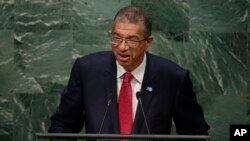The candidate favored by Benin's president to succeed him in next month's election would make a disastrous leader of the West African nation, a group of dissidents from the ruling party and opposition politicians said Tuesday.
The group, which includes trade union leaders, did not propose its own candidate, but the statement is likely to raise the temperature ahead of the election to replace President Thomas Boni Yayi, who must step down after two terms in office.
The election is considered open because there is no incumbent but, in a first for Benin, Boni Yayi has backed a candidate — his prime minister, Lionel Zinsou, an economist and former investment banker of French and Beninese origin.
"They have parachuted in to us a colonizer whose mission is to safeguard the economic crimes of Boni Yayi," Paul Isse Iko, the secretary-general of the confederation of workers' unions in Benin, told journalists on behalf of the group.
Zinsou, who spent a large portion of his life in France, is viewed by some as an outsider far removed from the realities of life in the West African nation.
The group, which includes a former president of Benin and former leader of the national assembly, said they wanted to prevent Zinsou from running and planned to form a coalition against him once a final decision had been made.
The government issued a press release Sunday in response to similar statements made about Zinsou, saying: "These assertions ... call to the base instincts of hatred, racism, fear and intolerence."
"Our countryman targeted by these remarks is a full citizen of Benin," the statement added.
Zinsou, who was named last June to head a cabinet tasked with bolstering Benin's economy, said his presidency would focus on alleviating poverty and getting more workers into the formal sector, which includes all jobs recognized as sources of taxable income.
Benin has been affected by a slowdown in Nigeria, its much larger neighbor and a major trading partner. The International Monetary Fund said Benin's national product would grow 5.5 percent this year.





